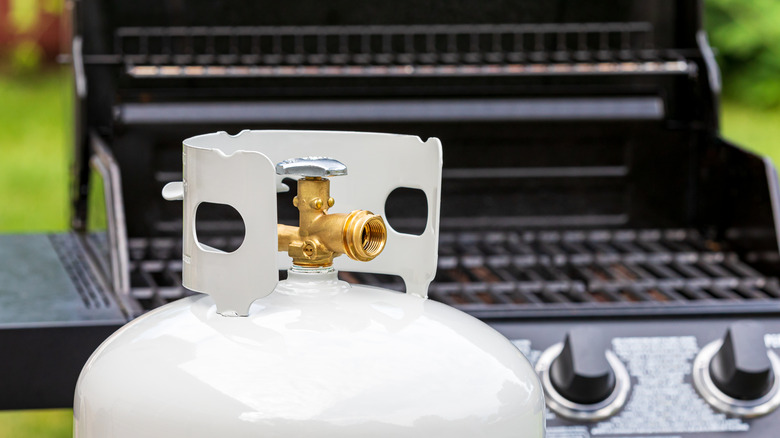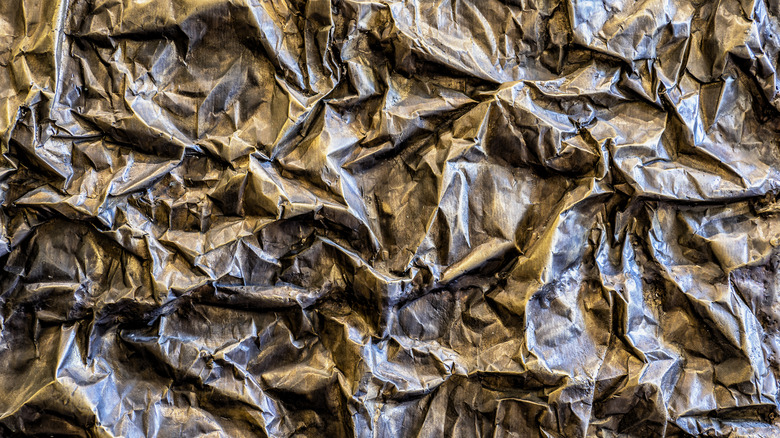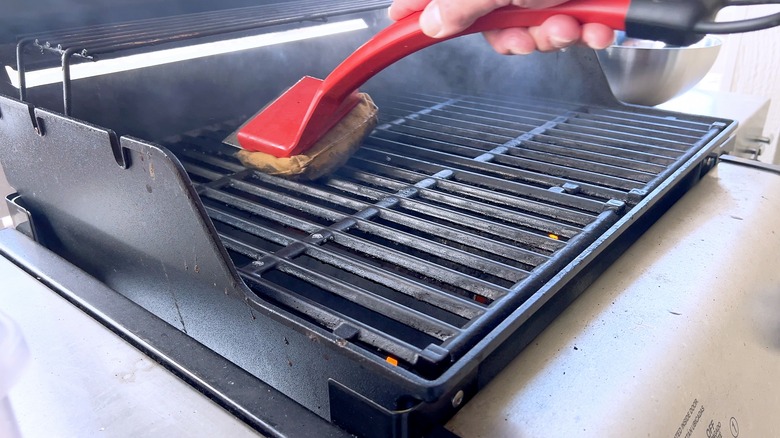The Grill Cleaning Hack That's Actually Pretty Dangerous
There are all kinds of reasons to look forward to the warm weather, and the prospect of firing up the gas grill is a big one. Unfortunately, these magical cooking tools can be a bit of a challenge to maintain, and although there are all kinds of tips for keeping your grill shiny and clean, they're not all created equal. Some, in fact, are downright dangerous, and if you're using aluminum foil to cover and clean your grill's grates, you should stop that — immediately.
The oft-repeated yet ill-advised advice is to cover your grill's grates with foil, turn up the heat, and let the foil burn off — along with any gunk that might have collected there. The problem is that a layer of foil is definitely going to interfere with the air flow inside your grill, and that can lead to some serious damage and a potentially dangerous situation, should the internal environment of your grill get to a point where the heat decides to escape in another way.
In fact, there are a number of reasons why you should rethink using aluminum foil this grilling season. Not only is it unsustainable and not environmentally friendly, but some studies show that using aluminum foil regularly can actually increase the amount of aluminum that you ingest — particularly when it's used in high-heat environments. Fortunately, taking aluminum out of your grilling equation is easy, and just takes a tad more elbow grease. It's worth it though, right?
Blocking the air flow in your gas grill is never a good idea
Let's talk about just what might happen if you decide to clean your grill by completely covering the grates with foil and turning it on. The inside of a grill is designed with air flow in mind, and when that air flow stops, certain parts of the grill can be subjected to much higher temperatures than they're designed for. The least of your problems might be grates that begin to warp, and the worst?
If hoses and gas lines start to melt inside your grill, that might mean the heat could get trapped inside. We all know what's under that gas grill, right? Propane tanks. They're rated for exposure to certain temperatures, and if that temperature rises beyond the safe zone, well, there's not much that's going to ruin a backyard barbecue faster than a mix of flame and overheated propane tanks. Pellet grills can also be damaged in a similar way, as they're specifically designed to work with air flow in mind.
The same principle is exactly why you should avoid another grill-cleaning hack, which is covering the grill's slide-out tray with foil. The idea is usually that it'll catch any grease, but most grills are designed with trays that funnel away grease instead of holding it. Sure, that foil is going to catch and collect the grease, but it's also going to collect heat — and then, you're risking that grease catching on fire.
There are much safer ways to clean your grill grates
If using aluminum foil with your grill grates was your go-to method, we have some good news: Keeping your grill clean without foil isn't difficult, especially if you keep on top of the job. Wondering how often you should clean your grill? At least once a week, and one of the easiest ways is to do exactly what you were doing in the aluminum foil method, but without the foil. Turn on the heat, close the lid, and then scrape the grates clean using a brush that's specifically meant for use on grills.
Further maintenance depends on what material your grill's grates are made of: Porcelain grates, for example, will chip if you use some of the strongest tools on them, and they need only the occasional soak and a nylon grill brush to keep them in tip-top shape. Cast iron grates, on the other hand, will rust if they get wet. Scrub those and seal them with a layer of vegetable oil and you're good to go for the next time you're ready to fire up that grill.
When it comes to stainless steel grates, a sprinkle of baking soda and a light spray of white vinegar will work wonders, loosening caked-on residue to allow you to scrape it clean. No matter what your grill grates are made of, cleaning them regularly will keep this from becoming an unbearably unpleasant job, and you won't miss using that aluminum foil trick.


